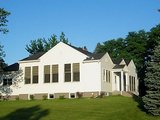Pilgrim House
Unitarian Universalist Fellowship
Our Background
(redirected from PH.History)
Pilgrim House was founded in 1970 as a non-denominational liberal religious community, following a philosophical split within a mainstream Lutheran congregation. In the time since then, the size and composition of our membership have changed, but the fundamental values that define Pilgrim House have remained the same. In 1970 Al Linck, our first Board Chair, wrote "A Viewpoint on Pilgrim House Philosophy" to explain our religious commitment. The following excerpt describes Pilgrim House as well now as it did then:
It has been said that Pilgrim House is not doctrinaire and has no creed. This does not mean that individually and, to a degree collectively, members will have no beliefs. This says simply that no beliefs will be written down as House dogma and as requirements for membership. Blind adherence to a set of beliefs is antithetical to the very spirit of Pilgrim House. A person disposed to question things (religious and secular), a person seeking individual answers, a person committed to freedom of choice in his understanding of life and death: this person should find sensitive, responsive people and a challenging atmosphere in Pilgrim House. Critical to the development and perpetuation of this atmosphere (in itself a kind of belief) is a thoughtful, tolerant attitude on the part of Pilgrim House members. By providing an atmosphere of free inquiry, stimulating discussion, creative expression and mutual concern and respect for each other, Pilgrim House hopes to help each person find greater fulfillment.
Our founding minister was the Reverend Dick Otten, who led the group as a non-denominational fellowship until 1978. Our first communal meeting space was a demonstration model A-frame on County Road F in Shoreview, and Dick’s first pulpit was a ladder. Shortly afterward we bought a one-room school house in neighboring Arden Hills, built shortly after World War II. (One of our members had even briefly attended school there.) We became attached in many ways to the metaphor of the one-room classroom as the model for our journey of discovery.
When Dick Otten left, Pilgrim House continued for several years as an all-volunteer, lay-led non-denominational fellowship.

In 1985 we adopted the Unitarian Universalist identity and affiliated with the national Unitarian Universalist Association (UUA). As part of this process, we adopted the Seven Principles of Unitarian Universalism as an additional foundation for our spiritual search. It was, in large part, the eloquence of the seven principles in defining our relationship to the world that convinced us to join the UUA.
In the mid-1990s, we realized we had outgrown our wonderfully sunny classroom. We built an addition to hold a larger meeting room (see Addition Photos), but have tried to preserve the feel of the historic school building, turning the old classroom into our Fellowship Hall.
